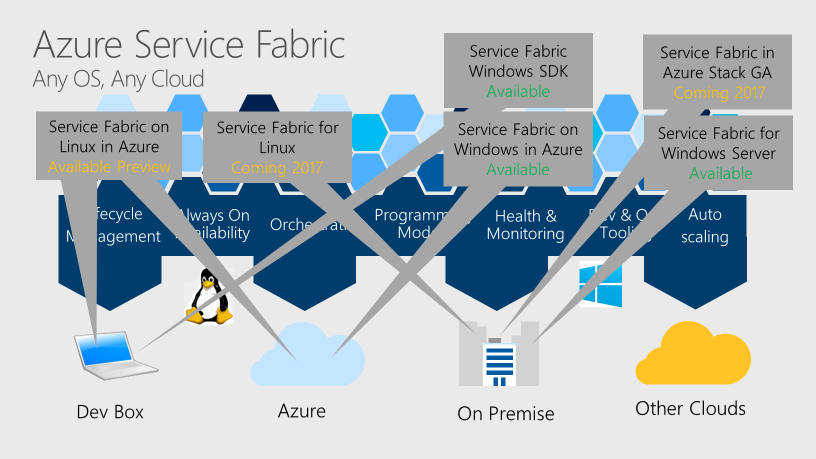"Like Kubernetes, Service Fabric lets developers orchestrate their microservices. Where Service Fabric goes further than Kubernetes is the automated lifecycle management it offers. It can manage, for example, software updates and watch over the health of the services throughout the process."
Create an Azure Service Fabric reliable service with C# | Microsoft Docs

GitHub - Microsoft/service-fabric: Service Fabric is a distributed systems platform for packaging, deploying, and managing stateless and stateful distributed applications and containers at large scale.
GitHub - kubernetes/kubernetes: Production-Grade Container Scheduling and Management
Service Fabric seems to be mostly written in C++,
and Kubernetes, Docker and even (parts of) Azure ACS are in GoLang.
From my experience GoLang developement 10x faster than C++.
There is a possibility of some integration of AFS and ACS. With GoLang :)
Microsoft Brings Container Orchestration to Azure Service Fabric, for Windows and (Soon) Linux - The New Stack
 "Microsoft is investing in containers, both with its Azure Container Service and with Azure Service Fabric, its distributed systems platform for building microservices apps.
"Microsoft is investing in containers, both with its Azure Container Service and with Azure Service Fabric, its distributed systems platform for building microservices apps.
Service Fabric is the fabric that Azure runs on, made available to developers. Azure SQL Database, Skype for Business, Service Bus, Event Hubs, Cosmos DB, Intune and other Microsoft cloud services run on Service Fabric. Users can deploy the cloud version in Azure and soon other clouds or put the runtime on their own Windows and soon Linux servers.
...
Originally pitched to developers as a PaaS for building cloud services, Service Fabric is also being used by organizations to “lift and shift” existing applications to the cloud... a new version of Azure Service Fabric (version 5.6) would handle container orchestration duties for Windows Server Containers.
Brendan Burns (co-creator of Kubernetes) who now runs the Microsoft ACS team, views Service Fabric as “a container orchestrator just like Kubernetes or anything else; it also has a richer environment for building applications. It combines the ability to deploy containers with a richer programming environment.”
- "Unikernels
- Simpler microservices APIs (via the “service mesh”)
- More integration with legacy technologies (VMs)
- GUI-friendly containers"



